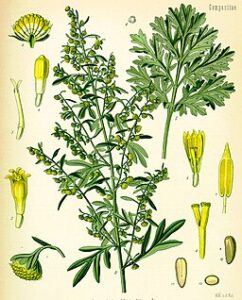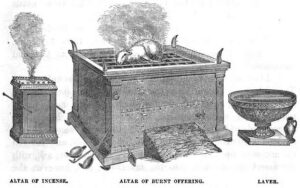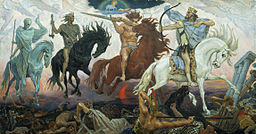“And they had as king over them the angel of the bottomless pit, whose name in Hebrew is Abaddon, but in Greek he has the name Apollyon” (Revelation 9:11).
Abaddon and Apollyon are words that convey a similar meaning: destruction, or destroyer. This has led some to speculate that a single demonic entity governs the Abyss and directs these locust beings to inflict pain and suffering upon their human victims.
“One woe is past. Behold, still two more woes are coming after these things. Then the sixth angel sounded: And I heard a voice from the four horns of the golden altar which is before God, saying to the sixth angel who had the trumpet, ‘Release the four angels who are bound at the great river Euphrates.’
So the four angels, who had been prepared for the hour and day and month and year, were released to kill a third of mankind. Now the number of the army of the horsemen was two hundred million; I heard the number of them” (Revelation 9:12-16).
 The Euphrates River is a lengthy waterway that traverses a significant portion of the Middle East. This body of water flows from the mountains of Turkey through the nations of Syria and Iraq and later joins the Tigris River before it reaches the Persian Gulf on the Iranian border. The Euphrates River once formed the eastern boundary of the ancient Roman Empire for several centuries, as well as the land God promised to Abraham’s descendants, the Jewish people (see Genesis 15:18).
The Euphrates River is a lengthy waterway that traverses a significant portion of the Middle East. This body of water flows from the mountains of Turkey through the nations of Syria and Iraq and later joins the Tigris River before it reaches the Persian Gulf on the Iranian border. The Euphrates River once formed the eastern boundary of the ancient Roman Empire for several centuries, as well as the land God promised to Abraham’s descendants, the Jewish people (see Genesis 15:18).
Other ancient civilizations that controlled portions of the Euphrates river valley included the Hittites (the modern day inhabitants of Turkey), the Assyrians (modern day Syria), the Babylonians (modern day Iraq), and the Persians (modern day Iran). These people groups brought considerable adversity upon the nation of Israel during the Old Testament period. In addition, the Biblical book of Daniel chronicles the account of an angelic being who had been intercepted by a spiritual adversary who was identified as “the Prince of Persia” (see Daniel chapter ten, verses thirteen and twenty).
Therefore, it should not surprise us to learn that four demonic beings have been incarcerated within this area. And even though the locusts that were released from the Abyss were truly horrific, they only possessed the capability to inflict suffering and torment upon their victims. In contrast, the angelic beings seen here in Revelation 9:12-16 are executioners who hold the power to act upon their murderous intent.
Image Attribution : Alen Ištoković, CC BY 3.0, via Wikimedia Commons


 These verses present us with the imagery of a key that opens the door to malevolent spiritual forces. This should prompt us to consider other doors that should remain closed as we travel the corridor of life. For instance, some of those doors may open the way to an inappropriate relationship, financial devastation, or involvement with various forms of the occult, among others.
These verses present us with the imagery of a key that opens the door to malevolent spiritual forces. This should prompt us to consider other doors that should remain closed as we travel the corridor of life. For instance, some of those doors may open the way to an inappropriate relationship, financial devastation, or involvement with various forms of the occult, among others. In addition to the losses described in the previous verses of Revelation chapter eight, this passage tells us that there will be a thirty-three percent reduction in natural light. Whatever the cause, this will undoubtedly lead to negative changes in the areas of global meteorology, temperature, and agriculture, among others.
In addition to the losses described in the previous verses of Revelation chapter eight, this passage tells us that there will be a thirty-three percent reduction in natural light. Whatever the cause, this will undoubtedly lead to negative changes in the areas of global meteorology, temperature, and agriculture, among others. Verse eleven also adds some additional detail: “The name of the star is Wormwood.” Wormwood is a type of plant that is described by one commentator in the following manner…
Verse eleven also adds some additional detail: “The name of the star is Wormwood.” Wormwood is a type of plant that is described by one commentator in the following manner… Revelation 8:3 draws upon the imagery of an Old Testament-era priest and the
Revelation 8:3 draws upon the imagery of an Old Testament-era priest and the  As we’re reminded in the New Testament book of 1 Corinthians, “Now we see things imperfectly, like puzzling reflections in a mirror, but then we will see everything with perfect clarity. All that I know now is partial and incomplete, but then I will know everything completely, just as God now knows me completely” (1 Corinthians 13:12 NLT).
As we’re reminded in the New Testament book of 1 Corinthians, “Now we see things imperfectly, like puzzling reflections in a mirror, but then we will see everything with perfect clarity. All that I know now is partial and incomplete, but then I will know everything completely, just as God now knows me completely” (1 Corinthians 13:12 NLT). But now, they stood before His throne. This group raised a poignant question in the previous chapter: “How long, O Lord, holy and true, until You judge and avenge our blood on those who dwell on the earth?” (Revelation 6:10). But now, they held palm branches, a symbol of victory and triumph.
But now, they stood before His throne. This group raised a poignant question in the previous chapter: “How long, O Lord, holy and true, until You judge and avenge our blood on those who dwell on the earth?” (Revelation 6:10). But now, they held palm branches, a symbol of victory and triumph. Revelation 7:1 begins by saying, “After this I saw four angels standing at the four corners of the earth…” This reference to the “four corners of the earth” represents each of the four compass points of the globe. Those angels were responsible for “…holding back the four winds of the earth so no wind could blow on the earth, on the sea, or on any tree” (NET). The “winds” referenced in this passage convey the idea of a violent agitation, a stream of air, or a strong tempestuous wind. (1)
Revelation 7:1 begins by saying, “After this I saw four angels standing at the four corners of the earth…” This reference to the “four corners of the earth” represents each of the four compass points of the globe. Those angels were responsible for “…holding back the four winds of the earth so no wind could blow on the earth, on the sea, or on any tree” (NET). The “winds” referenced in this passage convey the idea of a violent agitation, a stream of air, or a strong tempestuous wind. (1) 18 May, 1980, witnessed the cataclysmic eruption of Mount St. Helens, a volcanic mountain in the western United States. Triggered by an earthquake that registered at 5.1 on the Richter scale, the lateral blast emanating from the mountain’s northern flank ripped through the surrounding landscape at an astonishing speed of 300 miles per hour (483 kph). That eruption produced a 230 square mile (370 square km) periphery of devastation that extended 17 miles (27 km) from the crater. It also produced a vertical eruption of gas and ash that reached 16 miles (26 km) into the atmosphere. 57 people lost their lives in the devastation that followed. (1)
18 May, 1980, witnessed the cataclysmic eruption of Mount St. Helens, a volcanic mountain in the western United States. Triggered by an earthquake that registered at 5.1 on the Richter scale, the lateral blast emanating from the mountain’s northern flank ripped through the surrounding landscape at an astonishing speed of 300 miles per hour (483 kph). That eruption produced a 230 square mile (370 square km) periphery of devastation that extended 17 miles (27 km) from the crater. It also produced a vertical eruption of gas and ash that reached 16 miles (26 km) into the atmosphere. 57 people lost their lives in the devastation that followed. (1) In the late 1800s, the Indonesian island of Krakatoa experienced a volcanic eruption that ranks among history’s most catastrophic natural disasters. Krakatoa’s eruption in August, 1883, generated devastating tsunamis up to 130 feet (40m) high. In its final stages, the noise produced by the exploding volcano was heard thousands of miles away in Australia. The immense power of the volcano’s eruption resulted in the near-total destruction of Krakatoa, along with several nearby islands. It also led to an estimated death toll of more than 36,000 people. (2)
In the late 1800s, the Indonesian island of Krakatoa experienced a volcanic eruption that ranks among history’s most catastrophic natural disasters. Krakatoa’s eruption in August, 1883, generated devastating tsunamis up to 130 feet (40m) high. In its final stages, the noise produced by the exploding volcano was heard thousands of miles away in Australia. The immense power of the volcano’s eruption resulted in the near-total destruction of Krakatoa, along with several nearby islands. It also led to an estimated death toll of more than 36,000 people. (2) Many centuries earlier, in 79 A.D., the eruption of Mount Vesuvius devastated the ancient Roman cities of Pompeii and Herculaneum in southern Italy. A deluge of volcanic ash and pumice stones engulfed those urban areas, prompting many residents to flee and others to seek shelter. Those who remained in Pompeii were subsequently killed when a cloud of toxic gas engulfed the city. Today, one can tour the architectural ruins of Pompeii and view casts taken of some of those individuals as they faced their final moments of life. (3)
Many centuries earlier, in 79 A.D., the eruption of Mount Vesuvius devastated the ancient Roman cities of Pompeii and Herculaneum in southern Italy. A deluge of volcanic ash and pumice stones engulfed those urban areas, prompting many residents to flee and others to seek shelter. Those who remained in Pompeii were subsequently killed when a cloud of toxic gas engulfed the city. Today, one can tour the architectural ruins of Pompeii and view casts taken of some of those individuals as they faced their final moments of life. (3) An identical command accompanied the opening of each of the first four seals: “Come and see.” And much like the Apostle John in the book of Revelation, we are also invited to see these emerging horsemen for ourselves. But despite the vivid descriptions of these riders, their identities have been the subject of great debate down through the centuries. We’ll take a closer look at the first horseman of the apocalypse beginning next.
An identical command accompanied the opening of each of the first four seals: “Come and see.” And much like the Apostle John in the book of Revelation, we are also invited to see these emerging horsemen for ourselves. But despite the vivid descriptions of these riders, their identities have been the subject of great debate down through the centuries. We’ll take a closer look at the first horseman of the apocalypse beginning next. In light of those responsibilities, we would do well to consider the way we currently manage the blessings and opportunities God has given us today. For instance, a Christ-oriented life factors the following questions into the decision-making processes of daily living…
In light of those responsibilities, we would do well to consider the way we currently manage the blessings and opportunities God has given us today. For instance, a Christ-oriented life factors the following questions into the decision-making processes of daily living… One of the more common illustrations of the heavenly realm features angelic beings who float among the clouds while gently strumming harps. That imagery is likely derived (at least in part) from our text here in Revelation 5:8. Nevertheless, this verse highlights an important element that we might easily overlook: the depiction of the prayers offered by God’s people as golden bowls filled with fragrant incense.
One of the more common illustrations of the heavenly realm features angelic beings who float among the clouds while gently strumming harps. That imagery is likely derived (at least in part) from our text here in Revelation 5:8. Nevertheless, this verse highlights an important element that we might easily overlook: the depiction of the prayers offered by God’s people as golden bowls filled with fragrant incense. This passage then continues with an important detail regarding this scroll, for we are told that it was inscribed on both sides. Although ancient scrolls were typically single-sided, many commentators note that title deeds formed an exception. For instance, the inner portion of a title deed offered a description of the property in question. If a financial hardship led to the sale of that property, the amount owed and repayment terms were written on the outside. Once that information was transcribed, the scroll was refastened with strings and sealed with wax over the knots for security purposes.
This passage then continues with an important detail regarding this scroll, for we are told that it was inscribed on both sides. Although ancient scrolls were typically single-sided, many commentators note that title deeds formed an exception. For instance, the inner portion of a title deed offered a description of the property in question. If a financial hardship led to the sale of that property, the amount owed and repayment terms were written on the outside. Once that information was transcribed, the scroll was refastened with strings and sealed with wax over the knots for security purposes. Lightning is among the many wonders of our natural world. A lightning strike with an accompanying peal of thunder may be breathtaking or terrifying, depending on your proximity. Thus, it serves as an excellent representation of God’s immense power. That reference here in Revelation 4:5 is followed by a second appearance of “the seven Spirits” mentioned earlier in
Lightning is among the many wonders of our natural world. A lightning strike with an accompanying peal of thunder may be breathtaking or terrifying, depending on your proximity. Thus, it serves as an excellent representation of God’s immense power. That reference here in Revelation 4:5 is followed by a second appearance of “the seven Spirits” mentioned earlier in  While a royal throne is relatively easy to visualize, it is little more than a highly ornamented armchair if we strip those embellishments away. A throne will not confer special status upon anyone who sits upon it, except perhaps to document his or her experience on social media.
While a royal throne is relatively easy to visualize, it is little more than a highly ornamented armchair if we strip those embellishments away. A throne will not confer special status upon anyone who sits upon it, except perhaps to document his or her experience on social media. passage from Revelation 4:1. Those words are “meta tauta” in the original language of each verse, or “after this.” In other words, the end of Revelation 1:19 corresponds with the beginning of Revelation 4:1.
passage from Revelation 4:1. Those words are “meta tauta” in the original language of each verse, or “after this.” In other words, the end of Revelation 1:19 corresponds with the beginning of Revelation 4:1. Finally, we have this: “…write down… what is going to happen after these things” (GW). This is where the book of Revelation begins to talk about the future, or “…what will be after these things” (NET). With this in mind, we can say that this passage speaks of…
Finally, we have this: “…write down… what is going to happen after these things” (GW). This is where the book of Revelation begins to talk about the future, or “…what will be after these things” (NET). With this in mind, we can say that this passage speaks of… One of the more striking parallels between the first-century church of Laodicea and our twenty-first century world is a mutual sense of apathy or indifference. That common thread of complacency makes Jesus’ message to this church especially relevant for today.
One of the more striking parallels between the first-century church of Laodicea and our twenty-first century world is a mutual sense of apathy or indifference. That common thread of complacency makes Jesus’ message to this church especially relevant for today. For instance, we might assume that Jesus served as the primary object of worship in the church of Laodicea. But if that was true, then why was He made to wait outside, as implied in the verse quoted above? Furthermore, why did He have to request entry into what was allegedly His church? The most plausible explanation is that this was the church of the Laodiceans, and not Jesus’ church in Laodicea. This likely meant that the church of Laodicea had very little in common with Jesus, except perhaps in name only.
For instance, we might assume that Jesus served as the primary object of worship in the church of Laodicea. But if that was true, then why was He made to wait outside, as implied in the verse quoted above? Furthermore, why did He have to request entry into what was allegedly His church? The most plausible explanation is that this was the church of the Laodiceans, and not Jesus’ church in Laodicea. This likely meant that the church of Laodicea had very little in common with Jesus, except perhaps in name only. On the other hand, an excellent teacher or coach will motivate, instruct, and correct students and athletes in order to enable them to perform at their highest level. Our text from Revelation 3:19 tells us that Jesus does much the same in our spiritual lives. Although it is rarely easy to face correction and discipline, those qualities enable us to secure the growth and development that God seeks for us.
On the other hand, an excellent teacher or coach will motivate, instruct, and correct students and athletes in order to enable them to perform at their highest level. Our text from Revelation 3:19 tells us that Jesus does much the same in our spiritual lives. Although it is rarely easy to face correction and discipline, those qualities enable us to secure the growth and development that God seeks for us.